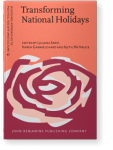Chapter 11. Disputes over national holidays
Bosnia and Herzegovina 2000–2010
This chapter analyzes the discourse of leading politicians in Bosnia and Herzegovina on the occasion of national holidays from 2000 to 2010. Fifteen years after the Dayton Agreement, Bosnia and Herzegovina has no common law on national holidays at the state level. This lack is due to varying concepts of history and how the state should be organized, and reveals deep-rooted conflicts in a society consisting of Bosniaks, Serbs, and Croats. Each of the two administrative parts of Bosnia and Herzegovina, referred to as entities, has its own holidays that are contested by the other entity. Within the Bosniak-Croat entity, there is a conflict between the two groups that constitute it. The discourse used to mark holidays is usually aimed at legitimizing one’s own holidays and delegitimizing others’ holidays. The analysis shows how the (de)legitimization strategies relate to time, space, and modality.
Cited by (2)
Cited by two other publications
Arthur, Catherine
2022.
Post-Conflict Nation-Building. In
The Palgrave Encyclopedia of Peace and Conflict Studies,
► pp. 1181 ff.

Arthur, Catherine
2022.
Post-Conflict Nation-Building. In
The Palgrave Encyclopedia of Peace and Conflict Studies,
► pp. 1 ff.

This list is based on CrossRef data as of 13 july 2024. Please note that it may not be complete. Sources presented here have been supplied by the respective publishers.
Any errors therein should be reported to them.
